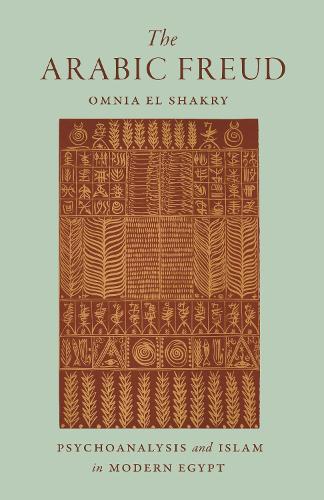
The Arabic Freud: Psychoanalysis and Islam in Modern Egypt
(Paperback)
Available Formats
Publishing Details
The Arabic Freud: Psychoanalysis and Islam in Modern Egypt
By (Author) Omnia El Shakry
Princeton University Press
Princeton University Press
9th June 2020
United States
Classifications
Tertiary Education
Non Fiction
Social and cultural history
Psychoanalytical and Freudian psychology
Psychology
Social groups: religious groups and communities
297.261
Physical Properties
Paperback
224
Width 156mm, Height 235mm
Description
The first in-depth look at how postwar thinkers in Egypt mapped the intersections between Islamic discourses and psychoanalytic thought In 1945, psychologist Yusuf Murad introduced an Arabic term borrowed from the medieval Sufi philosopher and mystic Ibn 'Arabi-al-la-shu'ur-as a translation for Sigmund Freud's concept of the unconscious. By the
Reviews
"Shortlisted for the Sheikh Zayed Award, Abu Dhabi Arabic Language Centre"
"A fascinating exploration into the forgotten world of psychology and psychoanalysis in post-Second World War Egypt. . . . El Shakry's book enables us to expand our knowledge of Arab and Islamic intellectual history and forces us to examine our notions about contact points between modern and pre-modern thought."---Usman Butt, New Arab
"The greatest strength of El Shakrys study lies in the way she brings discourses of modernity and pre-modernity together, exploring the traces of each in the other. This is a deliberate rhetorical strategy on her part, which yields far deeper and more meaningful insights than the traditional method of separation of premodern and modern."---Marsha Aileen Hewitt, Reading Religion
"It is an extraordinary study of post-colonial thought and of the history of psychology, which takes seriously psychoanalytic thought produced in a non-western society. . . . El Shakry uniquely uses psychoanalysis to examine the continuities and ruptures of post-colonial thought. . . . It is not merely a contextualization of Egyptian readings of psychoanalysis, but also a profound philosophical engagement with the implications of this intellectual encounter."---Liat Kozma, Psychoanalysis and History
"The Arabic Freud masterfully excavates the neglected archives of psychoanalysis in mid-twentieth century Egypt."---Fadi A. Bardawil, Immanent Frame
"El Shakrys Arabic Freud is a valuable contribution to the history of modern Egypt, Arab intellectual thought, and the global history of ideas."---Wilson Chacko Jacob, Journal of Arabic Literature
"The Arabic Freud . . . offers a richly researched intellectual history of an encounter between psychoanalysis and Islam which took place in Egypt over the 1940s and 1950s . . . . El Shakry recuperates these thinkers not simply as objects of historical inquiry, or as mere products of their political context, but producers of theory in their own right, whose arguments and ideas can enrich and expand our understandings of the self and the other, intuition and ethical cultivation, and psychoanalysis and Islam, today."---Chris Wilson, History of the Human Sciences
Author Bio
Omnia El Shakry is professor of history at the University of California, Davis. She is the author of The Great Social Laboratory: Subjects of Knowledge in Colonial and Postcolonial Egypt and the editor of Gender and Sexuality in Islam.
